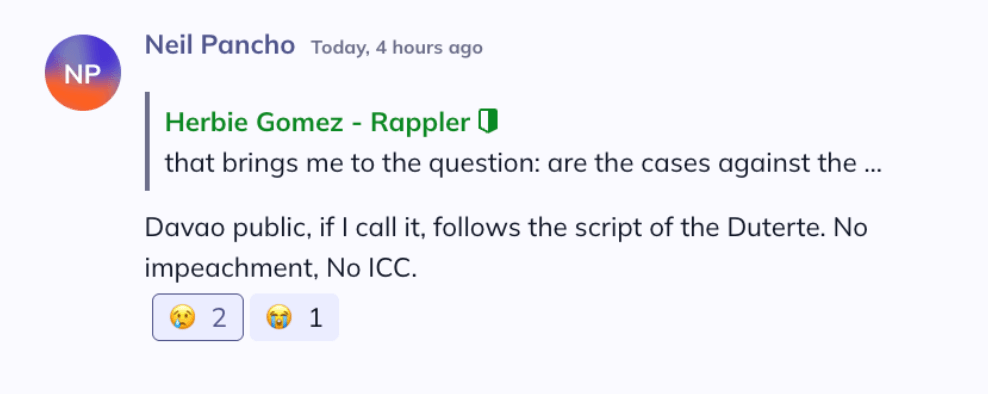Physical Address
304 North Cardinal St.
Dorchester Center, MA 02124
Physical Address
304 North Cardinal St.
Dorchester Center, MA 02124

MANILA, Philippines — For decades, the Dutertes have held deep political roots in Mindanao, particularly in their home base of Davao City.
The country’s first Mindanaoan president, former president Rodrigo Duterte, is currently detained in The Hague, the Netherlands, for his crimes against humanity. Meanwhile, his daughter, Vice President Sara Duterte, may face an impeachment trial due to conspiracy to commit murder, corruption, and betrayal of public trust.
Despite these, the former President still won the local elections for the mayoral race by a landslide, with family members also winning key posts.
But their influence is not limited to local politics. In the recent midterm election, Duterte-allied Partido ng Demokratiko Pilipino-Lakas ng Bayan’s (PDP-Laban) Senate bets led the race in many parts of Mindanao.
With the Dutertes under legal scrutiny, questions arise on how Mindanao, the heart of their political power, is responding to these developments.
During a community chat in the Philippine politics chat room on the Rappler app on Thursday, July 10, professor Neil Ryan Pancho and lawyer Meong Cabarde of Ateneo de Davao University, along with lawyer Ernesto Neri of Movement Against Disinformation, shared insights and realities on the ground regarding the legal battles of the Dutertes.
In many ways, the Duterte legacy is most deeply felt where it began: Davao City.
“The public follows the script of the Duterte,” said Pancho. Despite the high-profile cases, Davao City remains a Duterte stronghold, with residents largely opposing the International Criminal Court and impeachment trials.
But this sentiment is not unique in Davao City.
According to Neri, “Bring him home” posters hang across the streets of Cagayan de Oro, calling for the release of the former President — a reality that a chat participant based in Malaybalay resonated with.
Following the arrest of the former President on May 11, protests were also organized across Mindanao to denounce what supporters called a “political attack” against their leader.



Although there are many still supporting the Dutertes, Cabarde and Pancho observed that there are still Davao residents, primarily coming from civil society organizations and human rights advocates, who believe the impeachment trial of Vice President Sara Duterte is necessary.
This push for accountability has also reached the halls of Congress.
In February this year, 41 out of 60 Mindanao lawmakers backed the impeachment case against the Vice President. 7 out of 8 lawmakers in the Bangsamoro Autonomous Region in Muslim Mindanao (BARMM) are among the signatories.


But the Dutertes’ grip on power remains tight, as the impeachment proceedings against the Vice President took a turn on June 10, when the Senate voted to remand the articles of impeachment to the House of Representatives.
This tactic, according to Neri and many other human rights groups, is a deliberate move meant to delay the case.
Still, there are glimmers of change in Mindanao.
“Davao’s loyalty to the Dutertes runs deep,” said Cabarde, acknowledging the sense of order and stability the former President brought to the city during his term. But Cabarde also noted that loyalty isn’t blind, especially among the youth, who are increasingly discerning about human rights issues. Cabarde saw this firsthand in classrooms and forums he attended.
He noted that young Mindanaoans are becoming more critical, recognizing their efforts to fact-check, protest, and ask tough questions that the older generation often avoided.
With how the youth challenge the norm, Cabarde is hopeful that change is happening “one brave [conversation] at a time.”
Building on this generational awakening, Neri shared that he’s seen youth inspiring their elders with their volunteerism, especially during the elections.


Despite these encouraging signs, numbers on the ground paint a different story.
The 2025 Philippine Observatory Report on Democracy, shared by Neri, found that Davaoeños and Zamboangueños strongly favor strongman leadership. Former presidents Ferdinand E. Marcos and Duterte also ranked as figures who had a positive impact on democracy, despite their atrocious human rights track record.
The results are jarring, considering the 2 infamous presidents were known for their tyrannical leadership evident during Marcos’ Martial Law and Duterte’s war on drugs.
Neri and Cabarde find the results alarming and frustrating, but this prompted them to double their efforts in educating the youth.


“What shall we do now?” Rappler chat member Eriberto Taban-ud asked.
For Neri, initiating conversations within one’s circles of influence is important. In law school, this commitment is reflected in their efforts to provide modules on the impeachment process to give clarity on the proceedings.
Cabarde also called on the Filipinos to channel their frustration into meaningful action by demanding accountability, supporting truth-tellers, and protecting democratic spaces.


He also reminded everyone that demanding accountability should not end with the Dutertes’ conviction. The same standards must be applied to all, including President Bongbong Marcos.
“Justice must be complete, not selective,” Cabarde said. To achieve this, public vigilance is critical. Otherwise, as Neri warned, the ultimate victims would be the Filipino people and democracy itself.


What’s your take on the ICC trial of former President Rodrigo Duterte and Vice President Sara Duterte’s possible impeachment? Download the Rappler app for free on the Play Store or App Store and share your thoughts in the Philippine politics chat room. – Rappler.com